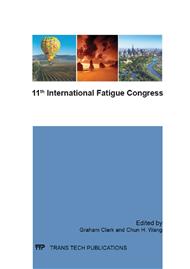p.1197
p.1205
p.1212
p.1217
p.1225
p.1231
p.1237
p.1243
p.1249
Proposal of an Eigen-Strain Estimation for Determination of Residual Stresses Considering the Influence of Machining
Abstract:
In order to assure structural integrity for mechanical structures, it is indispensable to estimate three-dimensional residual stresses quantitatively to asses a crack growth rate of an observed crack. Now, the neutron diffraction method and the DHD (Deep Hole Drilling) method have been proposed to evaluate stress gradient in the thickness direction. However, estimated stresses by these methods can not be input to the FEM (Finite Element Method) model that has been widely used at design time for the assessment of the structural integrity. Then, the eigen-strain method has been proposed. In this method, three-dimensional residual stresses are calculated by an elastic FEM analysis from eigen-strains those can be evaluated quantitatively by an inverse analysis from released strains measured by strain gauges while the geometric boundary condition or material properties of the object has been changed. However, inelastic strains are newly created on the machined surface, the estimation accuracy of this method becomes relatively poor because the eigen-strains before and after measurements have to be the same. In this study, a calculation technique to evaluate not only initial eigen-strains but also processing strains is shown, and effectiveness of this method is demonstrated numerically in the bead flush method based on the eigen-strain method. Although estimation accuracy of processing strains was poorer, three-dimensional residual stresses for whole region could be evaluated accurately from measured strains without measurement errors.
Info:
Periodical:
Pages:
1225-1230
Citation:
Online since:
March 2014
Authors:
Price:
Сopyright:
© 2014 Trans Tech Publications Ltd. All Rights Reserved
Share:
Citation:


